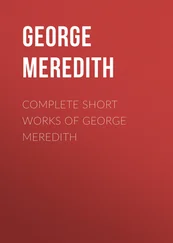George Meredith - Rhoda Fleming. Complete
Здесь есть возможность читать онлайн «George Meredith - Rhoda Fleming. Complete» — ознакомительный отрывок электронной книги совершенно бесплатно, а после прочтения отрывка купить полную версию. В некоторых случаях можно слушать аудио, скачать через торрент в формате fb2 и присутствует краткое содержание. Жанр: foreign_prose, literature_19, foreign_antique, на английском языке. Описание произведения, (предисловие) а так же отзывы посетителей доступны на портале библиотеки ЛибКат.
- Название:Rhoda Fleming. Complete
- Автор:
- Жанр:
- Год:неизвестен
- ISBN:нет данных
- Рейтинг книги:3 / 5. Голосов: 1
-
Избранное:Добавить в избранное
- Отзывы:
-
Ваша оценка:
- 60
- 1
- 2
- 3
- 4
- 5
Rhoda Fleming. Complete: краткое содержание, описание и аннотация
Предлагаем к чтению аннотацию, описание, краткое содержание или предисловие (зависит от того, что написал сам автор книги «Rhoda Fleming. Complete»). Если вы не нашли необходимую информацию о книге — напишите в комментариях, мы постараемся отыскать её.
Rhoda Fleming. Complete — читать онлайн ознакомительный отрывок
Ниже представлен текст книги, разбитый по страницам. Система сохранения места последней прочитанной страницы, позволяет с удобством читать онлайн бесплатно книгу «Rhoda Fleming. Complete», без необходимости каждый раз заново искать на чём Вы остановились. Поставьте закладку, и сможете в любой момент перейти на страницу, на которой закончили чтение.
Интервал:
Закладка:
“Not for worlds would she enter the house,” she said, in a general tone; she knowing better than to present herself where downright entreaty did not invite her.
Rhoda left her to count the numbers along the terrace-walk, and stood out in the road that her heart might select Dahlia’s habitation from the other hueless residences. She fixed upon one, but she was wrong, and her heart sank. The fair Mary Ann fought her and beat her by means of a careful reckoning, as she remarked,—
“I keep my eyes open; Number 15 is the corner house, the bow-window, to a certainty.”
Gardens were in front of the houses; or, to speak more correctly, strips of garden walks. A cab was drawn up close by the shrub-covered iron gate leading up to No. 15. Mary Ann hurried them on, declaring that they might be too late even now at a couple of dozen paces distant, seeing that London cabs, crawlers as they usually were, could, when required, and paid for it, do their business like lightning. Her observation was illustrated the moment after they had left her in the rear; for a gentleman suddenly sprang across the pavement, jumped into a cab, and was whirled away, with as much apparent magic to provincial eyes, as if a pantomimic trick had been performed. Rhoda pressed forward a step in advance of her father.
“It may have been her husband,” she thought, and trembled. The curtains up in the drawing-room were moved as by a hand; but where was Dahlia’s face? Dahlia knew that they were coming, and she was not on the look-out for them!—a strange conflict of facts, over which Rhoda knitted her black brows, so that she looked menacing to the maid opening the door, whose “Oh, if you please, Miss,” came in contact with “My sister—Mrs.—, she expects me. I mean, Mrs.—” but no other name than “Dahlia” would fit itself to Rhoda’s mouth.
“Ayrton,” said the maid, and recommenced, “Oh, if you please, Miss, and you are the young lady, Mrs. Ayrton is very sorry, and have left word, would you call again to-morrow, as she have made a pressing appointment, and was sure you would excuse her, but her husband was very anxious for her to go, and could not put it off, and was very sorry, but would you call again to-morrow at twelve o’clock? and punctually she would be here.”
The maid smiled as one who had fairly accomplished the recital of her lesson. Rhoda was stunned.
“Is Mrs. Ayrton at home?—Not at home?” she said.
“No: don’t ye hear?” quoth the farmer, sternly.
“She had my letter—do you know?” Rhoda appealed to the maid.
“Oh, yes, Miss. A letter from the country.”
“This morning?”
“Yes, Miss; this morning.”
“And she has gone out? What time did she go out? When will she be in?”
Her father plucked at her dress. “Best not go making the young woman repeat herself. She says, nobody’s at home to ask us in. There’s no more, then, to trouble her for.”
“At twelve o’clock to-morrow?” Rhoda faltered.
“Would you, if you please, call again at twelve o’clock to-morrow, and punctually she would be here,” said the maid.
The farmer hung his head and turned. Rhoda followed him from the garden. She was immediately plied with queries and interjections of wonderment by Miss Wicklow, and it was not until she said: “You saw him go out, didn’t you?—into the cab?” that Rhoda awakened to a meaning in her gabble.
Was it Dahlia’s husband whom they had seen? And if so, why was Dahlia away from her husband? She questioned in her heart, but not for an answer, for she allowed no suspicions to live. The farmer led on with his plodding country step, burdened shoulders, and ruddy-fowled, serious face, not speaking to Rhoda, who had no desire to hear a word from him, and let him be. Mary Ann steered him and called from behind the turnings he was to take, while she speculated aloud to Rhoda upon the nature of the business that had torn Dahlia from the house so inopportunely. At last she announced that she knew what it was, but Rhoda failed to express curiosity. Mary Ann was driven to whisper something about strange things in the way of purchases. At that moment the farmer threw up his umbrella, shouting for a cab, and Rhoda ran up to him,—
“Oh, father, why do we want to ride?”
“Yes, I tell ye!” said the farmer, chafing against his coat-collar.
“It is an expense, when we can walk, father.”
“What do I care for th’ expense? I shall ride.” He roared again for a cab, and one came that took them in; after which, the farmer, not being spoken to, became gravely placid as before. They were put down at Boyne’s Bank. Anthony was on the look-out, and signalled them to stand away some paces from the door. They were kept about a quarter of an hour waiting between two tides of wayfarers, which hustled them one way and another, when out, at last, came the old, broad, bent figure, with little finicking steps, and hurried past them head foremost, his arms narrowed across a bulgy breast. He stopped to make sure that they were following, beckoned with his chin, and proceeded at a mighty rate. Marvellous was his rounding of corners, his threading of obstructions, his skilful diplomacy with passengers. Presently they lost sight of him, and stood bewildered; but while they were deliberating they heard his voice. He was above them, having issued from two swinging bright doors; and he laughed and nodded, as he ran down the steps, and made signs, by which they were to understand that he was relieved of a weight.
“I’ve done that twenty year of my life, brother William John,” he said. “Eh? Perhaps you didn’t guess I was worth some thousands when I got away from you just now? Let any chap try to stop me! They may just as well try to stop a railway train. Steam’s up, and I’m off.”
He laughed and wiped his forehead. Slightly vexed at the small amount of discoverable astonishment on the farmer’s face, he continued,—
“You don’t think much of it. Why, there ain’t another man but myself Boyne’s Bank would trust. They’ve trusted me thirty year:—why shouldn’t they go on trusting me another thirty year? A good character, brother William John, goes on compound-interesting, just like good coin. Didn’t you feel a sort of heat as I brushed by you—eh? That was a matter of one-two-three-four” Anthony watched the farmer as his voice swelled up on the heightening numbers: “five-six-six thousand pounds, brother William John. People must think something of a man to trust him with that sum pretty near every day of their lives, Sundays excepted—eh? don’t you think so?”
He dwelt upon the immense confidence reposed in him, and the terrible temptation it would be to some men, and how they ought to thank their stars that they were never thrown in the way of such a temptation, of which he really thought nothing at all—nothing! until the farmer’s countenance was lightened of its air of oppression, for a puzzle was dissolved in his brain. It was now manifest to him that Anthony was trusted in this extraordinary manner because the heads and managers of Boyne’s Bank knew the old man to be possessed of a certain very respectable sum: in all probability they held it in their coffers for safety and credited him with the amount. Nay, more; it was fair to imagine that the guileless old fellow, who conceived himself to be so deep, had let them get it all into their hands without any suspicion of their prominent object in doing so.
Mr. Fleming said, “Ah, yes, surely.”
He almost looked shrewd as he smiled over Anthony’s hat. The healthy exercise of his wits relieved his apprehensive paternal heart; and when he mentioned that Dahlia had not been at home when he called, he at the same time sounded his hearer for excuses to be raised on her behalf, himself clumsily suggesting one or two, as to show that he was willing to swallow a very little for comfort.
Читать дальшеИнтервал:
Закладка:
Похожие книги на «Rhoda Fleming. Complete»
Представляем Вашему вниманию похожие книги на «Rhoda Fleming. Complete» списком для выбора. Мы отобрали схожую по названию и смыслу литературу в надежде предоставить читателям больше вариантов отыскать новые, интересные, ещё непрочитанные произведения.
Обсуждение, отзывы о книге «Rhoda Fleming. Complete» и просто собственные мнения читателей. Оставьте ваши комментарии, напишите, что Вы думаете о произведении, его смысле или главных героях. Укажите что конкретно понравилось, а что нет, и почему Вы так считаете.












